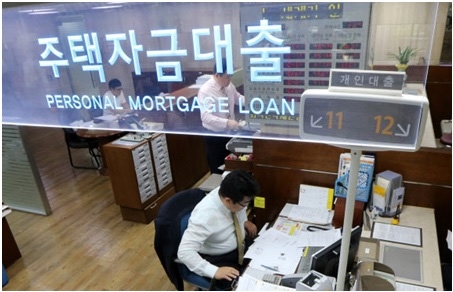With household loans rising by more than 100 trillion won last year, loan demand is not expected to ease in the first quarter of this year. This is because the craze for real estate and stock investments is continuing, such as ‘Young Cull’ (a loan that has been brought up to the soul) and ‘debt investment’ (investing in stocks through debt). However, it is expected to become more difficult to obtain loans from banks in the future. This is due to the increased awareness of credit risk to households and businesses as the real economy continues to slump. Financial authorities are also not slowing down tensions to block the overheating of asset markets such as stocks and real estate.
Looking at the’Financial Market Trends in December 2020′ announced by the Bank of Korea on the 14th, the bank’s household loan balance as of the end of December last year was 98.8 trillion won, which was 100.5 trillion won compared to the end of the previous year. This is the largest increase since statistics were compiled in 2004. The balance of mortgage loans was 71.9 trillion won and the balance of other loans was 266 trillion won, up 68.3 trillion won and 32.4 trillion won respectively from the previous year.
It is analyzed that the demand for livelihoods due to the novel coronavirus infection (Corona 19), the expansion of housing transactions and housing prices, and the expansion of demand for asset investment due to low interest rates led to a high rise in household loans. An official from the BOK explained, “Over the past year, home sales have increased, and demand for stock purchase funds such as various living funds and public offering stock payments seems to have influenced the increase in household loans.”
The increase in credit loans has subsided somewhat in December as financial authorities and banking sectors embarked on high-intensity lending restrictions at the end of last year, but they are expanding again in the new year. As soon as the banks resumed their halted credit loans, only major commercial banks rose more than 450 billion won in credit loans in just four days. KB Kookmin, Shinhan, Hana, Woori, and NH Nonghyup Bank, the five major commercial banks, their credit loan balance as of the 7th was 134.101.5 billion won, an increase of 453 billion won from the end of last year. Usually, the demand for credit loans declined at the beginning of the year due to seasonal effects such as bonuses, but this year, the demand for stock investment funds due to the booming stock market contributed to the surge in credit loans.
Loan demand is expected to continue to increase. As a result of a survey conducted by the Bank of Korea on December 7th to 18th last year with the person in charge of credit affairs at 201 financial institutions, it is expected that loan demand will increase in both households and businesses during the first quarter of this year. Compared to the fourth quarter of last year, the loan demand index for the first quarter was calculated as -3→9 for large companies, 18→26 for small and medium-sized businesses, 24→3 for households, and 44→18 for general households (including credit loans). Although the household sector figure has declined, it is still a positive value, which means that there are more people in charge of the loan business who expected an increase in loan demand.
Households are predicted that the number of people who want to receive loans mainly from general loans may increase as demand for financial investments such as home purchases, jeonse funds and stocks increase. Companies are also expected to see a rise in demand, mainly from small and medium-sized businesses, as sales decline and demand for surplus funds increases due to the sluggish economy and strengthening the distance from Corona 19.
The problem is that both households and businesses are expected to increase credit risk. Banks believe that credit risk will increase, mainly among low-credit and low-income groups, due to deterioration in repayment capacity due to a decrease in household income during the first quarter. In the case of companies, it was predicted that a slowdown in the real economy and uncertainty in internal and external conditions could lead to sluggish sales of corona19 vulnerable industries, and the soundness of borrowers with extended maturities and deferred principal and interest payments could also decline.
To respond to concerns about insolvency, the banking sector is expected to tighten its lending door. The lending attitude index of banks in the first quarter was -8, indicating that more loan officers responded to strengthen their lending compared to the fourth quarter of last year. In particular, the threshold for household loans is expected to increase due to the government’s regulation on credit loans and management of total loans.
Financial authorities are concerned about the rush of loan funds. Do Gyusangclose Do GyusangCollect articles At the’Financial Risk Response Group’ meeting on the 12th, the Vice Chairman of the Financial Services Commission said, “Recently, there is a view of concern about investment in assets such as real estate using excessive leverage. The banking sector asked for a special strengthening of the management of difficult loans.” On the 11th, the Financial Supervisory Service held a video conference with executives in charge of loans from major banks and ordered total household loans management. As credit loans exploded at the beginning of the year due to the debt-fighting craze, the financial authorities issued warning messages one after another.
Do GyusangCollect articles At the’Financial Risk Response Group’ meeting on the 12th, the Vice Chairman of the Financial Services Commission said, “Recently, there is a view of concern about investment in assets such as real estate using excessive leverage. The banking sector asked for a special strengthening of the management of difficult loans.” On the 11th, the Financial Supervisory Service held a video conference with executives in charge of loans from major banks and ordered total household loans management. As credit loans exploded at the beginning of the year due to the debt-fighting craze, the financial authorities issued warning messages one after another.
The financial authorities have decided to rein in the management of the increase in credit loans, such as strengthening the management of banknotes while monitoring whether credit loan funds are shifted to specific asset markets. The financial authorities said, “We plan to closely monitor the implementation status of the’Household Loan Management Plan’ while keeping an eye on the trend of household loans this year. “We will smoothly promote the soft landing of household debts, such as gradually shifting the management standards for the debt principle and repayment ratio (DSR) on a per borrower basis.”
Reporter Han Aran [email protected]
Daily Financial Economy News Copyright ⓒ Korea Financial News & FNTIMES.com
Unauthorized reproduction, copying, or distribution for commercial purposes is prohibited in accordance with copyright law.



